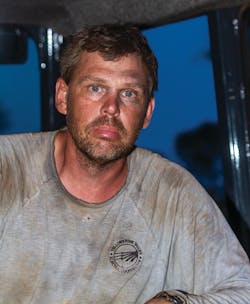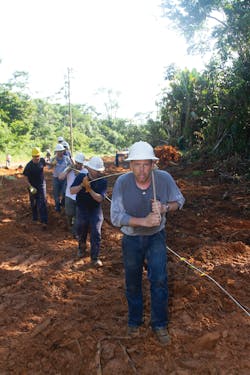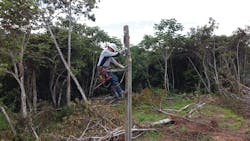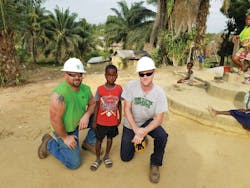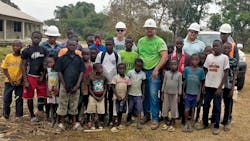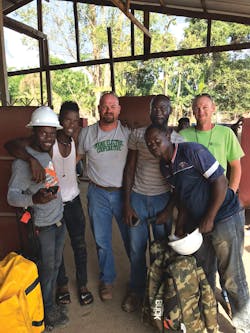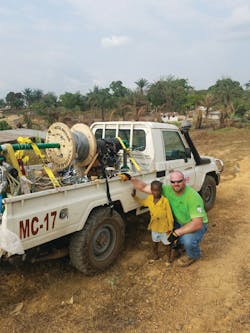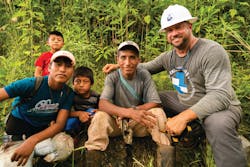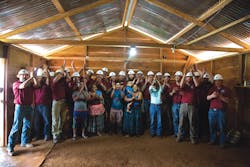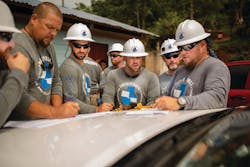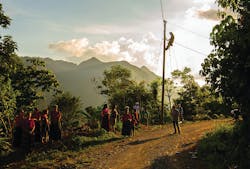When natural disasters inflict untold destruction, linemen spend weeks or even months away from their loved ones to restore power and rebuild infrastructure. Beyond storm duty, however, a select group of linemen are volunteering their time and talents on a different mission — to light up the world one community at a time.
Through the National Rural Electric Cooperative Association (NRECA)’s philantrophic arm — NRECA International — linemen are embarking on trips worldwide to build power lines in villages lit by candlelight. Here are the stories of four linemen who traveled to Liberia, Bolivia and Guatemala to build power lines, hook up electrical services and create a new world of opportunity for the communities abroad.
Building Power Lines in Bolivia
Two things inspired Mike Teter, a journeyman lineman for Yellowstone Valley Electric Cooperative, to spend three weeks in Bolivia—a sense of adventure combined with the opportunity to apply the trade to make someone else’s world a better place.
Teter, who works out of Huntley, Montana, is responsible for everything from residential services up to transmission construction and repair at his cooperative. He started on a right-of-way clearance crew the summer after his high school graduation, and he has been in the line trade ever since.
He jumped at the opportunity to leave for the trip on February 26 and return home on March 12. Like any overseas adventure, however, he and his team members encountered several hiccups in their travel plans.
“We had everything from flight delays and missed connections to the 116-mile, eight-hour bus ride through the jungle,” he said.
When he finally arrived at his work location, he and his team stayed in a small camp about 25 minutes from where the actual project was taking place. The scope of the project focused on framing the poles and installing the conductors and transformers. In addition, the linemen assisted with pole setting and right-of-way clearance. Once they returned to camp, they spent most of their evenings eating dinner, showering and going to bed following 12- to 14-hour work days. When possible, he enjoyed interacting with the local schoolchildren in the area.
“I am sure seeing us climb the poles and work the lines was quite a novelty to them, and at the end of the project they presented us with a cultural ceremony to thank us for our hard work,” he said.
During the three-week volunteer trip, the linemen faced many challenges including sweltering heat.
“The heat and the humidity were the worst,” he said. “I’ve never felt such conditions ever in my life. We would take breaks from 11:30 a.m. to 2 p.m. just to avoid the oppressive heat from the direct sun shining on top the right of way. Also working with just the bare necessities and little equipment made a challenging endeavor even more so.”
Volunteering overseas made him realize just how much he takes a lot of comforts, modern technologies and conveniences for granted while at home. It also taught him to be prepared for anything.
“I learned to keep an open mind and just roll with the punches and assume that nothing will go as planned,” he said.
In the end, however, he said it was a wonderful experience.
“Bringing a stable and reliable power source to a community that has never had one is truly a unique experience, one not often enjoyed by the linemen of today,” he said. “It was a great experience and I would definitely do it again.”
Living the Line Life in Liberia
Eight years ago, Jason Toalson first learned of the opportunity to travel to Liberia, Africa, on a volunteer mission. In February 2019, he spent three weeks assisting the local linemen to build a complete power supply for around 400 people in the village of Totota.
“I thought it would be a great experience to go and help out people who have a lot less than what we have here,” said Toalson, overhead construction foreman for Boone Electric Cooperative in Columbia, Missouri.
For the last 18 years, Toalson has worked in the line trade following a summer job at a cooperative in high school. Each morning, he and his crew load poles and materials, and then they spend the remainder of the day on the job site. The volunteer mission, however, provided a completely different work day experience. When he arrived in Liberia, he was struck with the realization that unlike in America, clean water can be hard to come by.
“I remember seeing the locals pumping or pulling buckets of water from the wells every time they needed them,” he said. “All day, you saw someone getting water from the wells.”
After getting settled in, he and his team trained the local linemen how to use the tools for the first time. For example, before they arrived, the Liberian linemen had not used climbing belts nor hooks. Because his cooperative donated the materials, the volunteer linemen were able to leave the tools on site with the linemen.
While he and his team were not in Liberia when the lights were first turned on, he did get to witness the excitement of helping out a local family.
“When we put service to a house, you could just tell how excited the locals were that they would have lights in their house soon,” he said. “It was surprising and rewarding to see someone excited about the opportunity to charge their cell phone at their home. Before that, they had to travel to charge their phones.”
Toalson and his volunteer team of linemen stayed in a hotel about 25 minutes away from the work location. Every night, the generator kicked in around 7 to 8 p.m., when they would go down to the dining area, watch soccer and eat dinner. The locals would often join the linemen to dine at the restaurant and cheer on their favorite teams. He remembers eating the same cuisine for dinner every night — chicken and rice.
“It was OK for the first week or so, but then it got old after that,” he says. “I had brought some small snacks from home that I would eat instead.”
He says for future volunteer linemen, he urges them to be patient with the local linemen who they are working with. It takes about a week to understand one another — both in language and working style. He is looking forward to volunteering in the future, he says.
“If the opportunity comes up again, I would love to go,” Toalson said.
Jeremy Wooden, a lead lineman for Boone Electric, also went to Liberia the same year as Toalson. The 15-year lineman says his cooperative has always had strong participation in overseas projects, and after talking to his coworkers and listening to his experiences, he decided to join the volunteer team on a three-week mission.
“My first impressions were scary,” Wooden said. “It was a completely different country and culture.”
By keeping an open mind and asking a lot of questions, however, he said volunteer linemen can be as prepared as possible for the challenges ahead. For example, over time, he became very close with not only the linemen who he was working with, but also the local crews. Everyone spoke English, but they had their own dialect.
“The local workers treated us like royalty, and I believe we did a very good job trying to teach them about the electrical system we built,” Wooden said. “Some of my favorite experiences were just hanging out with the local guys and talking to everyone about their culture.”
Giving Back in Guatemala
With a wife and two young kids, Journeyman Lineman Kyle Weber was hesitant at first to embark on an overseas adventure to Guatemala. After talking with a few other linemen who had already volunteered, however, he reconsidered.
“After talking to the second guy, I knew this was for me,” saidys Weber, who works for Tri-County Electric Cooperative (TCEC) in Hooker, Oklahoma. “I could hear the passion, excitement and meaning in their voices. I talked with my wife, and she could tell I was excited. She knew this was something I would love and be great at, so she was behind me 100% of the way. I applied that same day to be a volunteer.”
Weber, who has worked as a lineman for 13.5 years, says traveling overseas with the Oklahoma Energy Trails Foundation team from Aug. 24 to Sept. 9, 2019, was eye opening.
“I have traveled to other countries before, but that was to resorts with pools, nice hotels, etc.,” he said. “This was nothing like that. We were in a remote area in Guatemala for almost three weeks. The village we helped electrify was called Sillab. It was a different region than any other area I’ve been to. We prepared ourselves by walking, working out and meeting numerous times for team-building exercises. Those meetings for team building helped all of us to meet each other and bond.”
His first impression when he arrived in Guatemala was that it was beautiful, had amazing views and extremely hot weather. During the volunteer trip, Weber and the other volunteers stayed at a training center about five to 10 minutes from where they were working.
“It was a top-notch facility, and it reminded me of the dorm I stayed in during college,” he said. “The ladies who worked there were amazing.”
While everyone on the team was well versed in line work, the volunteers faced new challenges with the lack of equipment and terrain.
“We didn’t have the luxury of bucket trucks and driving up to every pole we worked on,” he said. “We had to hike into the mountainous area where the poles were located and climb every pole.”
The linemen had to think outside of the box while performing some of the jobs on the poles.
“We worked long, hot days, but everyone gave it their all,” he said. “Working with the villagers and the other linemen was awesome. It’s something I will never forget.”
At the end of a work day, he and the other volunteers would travel down to the village and play soccer, hang out and get to know the kids and the villagers. He said this was his favorite part of his day.
“Bonding with the kids was my favorite experience during the trip,” Weber said. “The kids loved playing soccer and us being kids with them. We would usually hang out there until dark then head back to the training center to rest up for the next day.”
On the first day of work, he says the villagers surprised them with a huge gathering. The kickoff celebration featured prayers for safety for each team member.
“The villagers wanted to show us they were there for us throughout this whole process,” Weber said “We were able to bond and form connections with the village. It’s crazy how fast you can connect with people in situations like these. Their culture is much different than ours.”
He said he enjoyed getting to know the villagers and learning the language, but the communication barrier was the hardest obstacle to overcome.
“Because the villagers helped us so much, we had to find creative ways to communicate,” he said. “It seemed like second nature to us by the end of the trip to have a full conversation with hand movements and pictures. We discovered there is a way to communicate with everyone, you only need the will and creativity to do it.”
One memory he will never forget is when the first light bulb came on.
“Seeing the pure joy and excitement in the villagers’ eyes was wonderful,” he said. “I was just there doing my job, but it was so much more than that. It’s something I will never forget.”
The experience taught him that happiness is a choice in life.
“When we arrived, in our eyes, it seemed the village of Sillab had nothing,” Weber said. “It turns out they had everything but electricity. They were full of life, happiness, family and culture. They’re the happiest people I’ve ever been around in my life. I couldn’t be prouder to have worked with these people.”
Any of the volunteers who went on the trip would go back in a heartbeat if asked, and he said he was the same for him.
“We did make an impact, but I didn’t realize it was me that was going to be impacted the most,” Weber said. “If I could give any lineman advice on going overseas, it’s this: go and experience it. You will be changed forever.”

